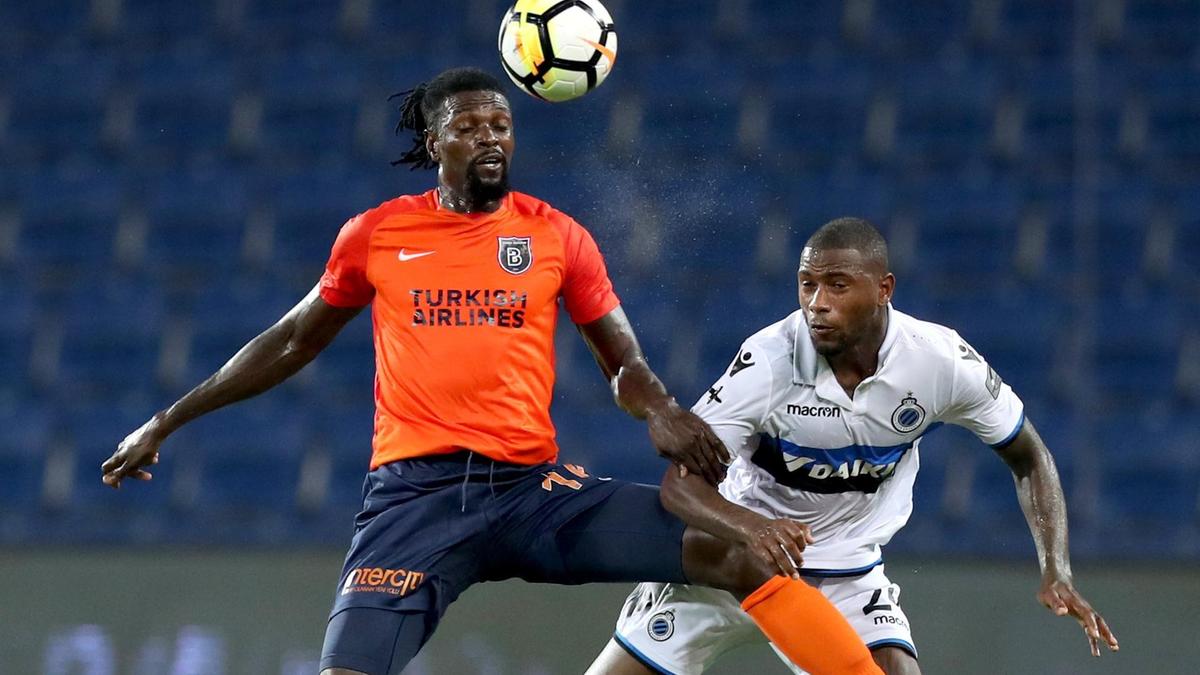Istanbul Basaksehir’s Emmanuel Adebayor, left, is one of the expensive foreign players plying their trade with the club. EPA
Critics say Istanbul Basaksehir’s title challange has been bankrolled by money connected to President Erdogan’s ruling party
In recent seasons, one nascent football club in Istanbul has become the side that Turkish fans love to hate.
Founded in 1990 as the side of the Istanbul municipality, Istanbul Basaksehir climbed the divisions to win promotion to the top flight in 2007. But, at the weekend, the club went one step closer to becoming only the sixth team to win Turkey’s premier football competition, the Super Lig, with a late goal sealing victory over their city rivals Fenerbahce.
It is not just the threat to the established order that has upset the supporters of Fenerbahce, Galatasaray and Besiktas – the “Big Three” who between them have won all but seven titles since the Super Lig was founded in 1959 – but rather Basaksehir’s government links and the perceived financial backing this has won the league leaders.
Since 2014, when it was bought by the current owners, Basaksehir has always finished in the top four, securing entry to Uefa’s Europa League.
This rapid rise has, according to critics, been based on government support and help from match officials, the latter being a persistent claim against successful clubs.
“Nobody knows exactly how they are financed because their books aren’t open but it seems they get a lot of sponsorship from companies involved in government contracts,” said Ferda Halicioglu, an economics professor at Istanbul Medeniyet University who has written about the finances of Turkish football.
“The suggestion is that as part of winning a contract these companies have to provide sponsorship to the club.”
The club’s directors have close ties to President Recep Tayyip Erdogan’s Justice and Development Party (AKP) and its chairman, Goksel Gumusdag, is married to a niece of the President’s wife.
At the opening of Basaksehir’s 17,000-capacity Fatih Terim Stadium in 2014, Mr Erdogan, a former semi-professional footballer, played in an inaugural match that saw him score a hat-trick. After that game, Basaksehir retired the No 12 shirt at a time when Mr Erdogan was campaigning to become Turkey’s 12th president. The team’s orange strip has even been said to have been inspired by the AKP’s colours.

Club executives, however, say it is its status as a joint-stock company that allows Basaksehir to implement the long-term planning not seen among the member-based clubs that have dominated Turkish football.
Due to a media embargo imposed in the run-up to a fixture break at the end of March, no-one at the club was available for comment but in the past, board members have pointed to the club’s investment in youth as another reason for its success.
The sale of Cengiz Under to Roma in 2017 for €13.4 million is cited as an example of the deals that have allowed the club to field a handful of established stars, alongside younger players.
At a time when many of Turkey’s leading clubs are jettisoning expensive foreign signings as they struggle to cope with huge debts, Basaksehir have the likes of Brazilian Robinho, former Chelsea forward Demba Ba and ex-Arsenal and Manchester City duo Emmanuel Adebayor and Gael Clichy on its books. The loan signing of Arda Turan, regarded as the best Turkish footballer of his generation, from Barcelona, came as no surprise to many given his outspoken support for the government.
Private ownership has allowed Basaksehir to retain respected coach Abdullah Avci and avoid the short-term decision-making that has characterised other clubs whose members demand big-name signings and managerial change when things start to go wrong.
Basaksehir’s rise has irritated many Turkish fans who point to average attendances of just over 3,000 this season as a sign of an “artificial” club.
Located in the outlying suburb from which the club takes its name, Basaksehir’s crowds are said to be bolstered by AKP members and staff from the neighbourhood’s AKP-run municipality.
It is one of the few grounds where the chant of “God is Great” can be heard while the name of its supporters’ group, 1453 Basaksehir, refers to the date of the Ottoman conquest of Istanbul and another link to Mr Erdogan’s “neo-Ottoman” vision for Turkey.
In recent years, the government has tightened restrictions in football grounds – introducing the Passolig ID system for fans – and the involvement of many supporters in the 2013 Gezi protests, where they spearheaded confrontations with the police, is said to have alarmed officials. A pliant football club would allow the AKP to present a popular image to the world of its conservative nationalist agenda.
Sports journalist Alp Ulagay said Basaksehir had flourished without the debts of rival clubs and because it did not have other sports clubs associated with it.
“Fenerbahce and Galatasaray support basketball, volleyball and other sporting teams but Basaksehir don’t have these,” he said. “All their revenue goes back into football. The Big Three have also been hit by Uefa’s Financial Fair Play rules so they can’t spend as much as in recent years.”
Addressing the perceived bias of match officials towards Basaksehir, Mr Ulagay said such practices had previously benefited the established sides.
“This might be one of the biggest factors in Basaksehir’s favour but for 30 years the big Istanbul clubs had such decisions in their favour when they were facing smaller teams,” he said. “Also, they received government backing, even to the extent of ministers helping them with player transfers. It seems the other fans are jealous of Basaksehir now because they’re the favoured team.”
With nine fixtures remaining, Basaksehir sit eight points ahead of another Istanbul rival, second-placed Galatasaray. Such a large points gap means the immediate future of Turkish football, appears to be Basaksehir orange.
Source: The National



